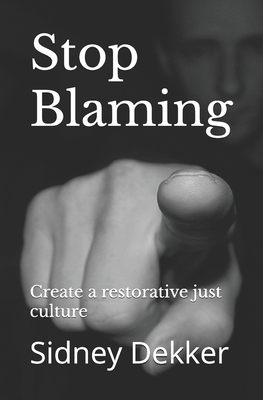There's been an incident in your organization. People are impacted. You need to do something. How do you avoid blame, and how do you start learning and improving? This book tells you how to respond restoratively. It lays out how to bend your response away from rules and violations and consequences. And to stay away from flow-chart just cultures that supposedly try to match shades of culpability with suitable sanctions. Instead, it invites you to ask what the impacts are of the incident. And what needs to be done to fix those impacts. And whose obligation is it to go do that. If you pursue these questions, you have already begun building a restorative just culture. A restorative just culture doesn't let people off the hook. It holds people accountable, even when it forgives them for what they did. It does so by engaging in a forward-looking accountability. It asks what you and they need to do-given your roles in the organization-to repair the harms that were caused, to rebuild the trust that was undermined, and to restore the relationships that were dented. Speaking directly to organisational leaders and others, this book explains how incidents are a stress test for you and your organization. It clarifies why retributive (flow-chart) just cultures don't work and why they probably do more harm than good. It shows how restorative just culture can become your compass and your guide, taking you through the identification of impacts, needs and obligations following an incident. It demonstrates how forgiveness and accountability can go hand in hand, and how there are rigorous and more useful alternatives to firing someone. It helps you with the question of who qualifies for restorative justice, and what the goals are that you might hope to achieve with it. The book discusses what to do if there's a conflict that needs resolving. It avoids large programs that need rolling out or that require an organization-wide implementation. Instead it suggests that you can gradually change your culture by building a little, testing a little, fixing and little and then building a little more. The book concludes with asking how good you need to be, and invites you to stop expecting perfection. It proposes that you might pursue integrity in your organization instead. Written by the leading voice on restorative just culture today, this little book is a quick read. It is presented in a format and a language that makes the ideas easily accessible. If you follow the guidance in it, y










